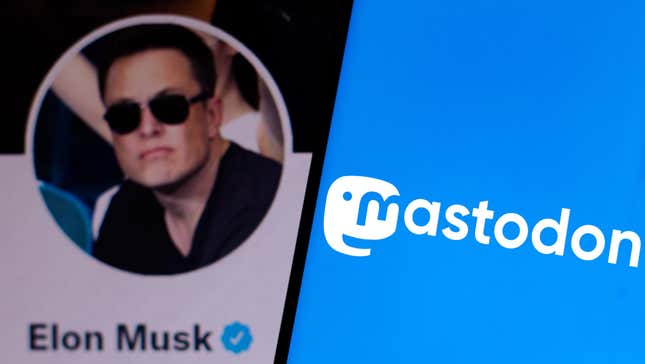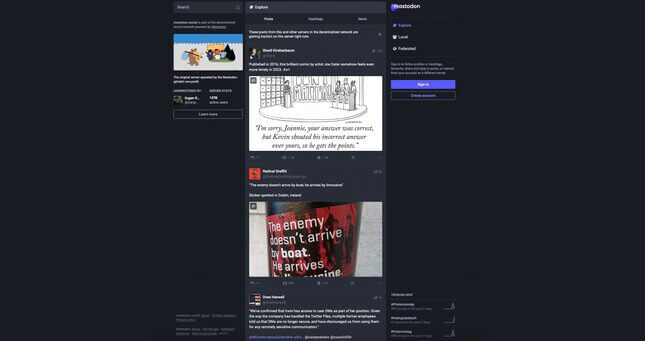Blocked Nazis and Boring Billionaires: What It’s Really Like on Mastodon and Post
An antifascist researcher gets the vibe of each Twitter alternative, just in time for Elon Musk to make another terrible decision.
In Depth

Nazis, manosphere weirdos, dirtbag “left” trolls, ambiguous terms of service, cakes that look like people…For all its utility, Twitter has never not been a hell site. Under Elon Musk, though, things are getting undeniably worse. Seemingly every day, a new Nazi gets his account back, even as Musk issues orders to suspend accounts working to hold Nazis accountable. Newly lax restrictions on covid disinformation mean our feeds are once again flooded with anti-vaxx conspiracy theories. Crypto spam worsens by the hour. And just when it seems like the Mad King of Twitter has slowed his roll on implementing bad policies, he pulls out a new horror. The latest travesty: the reinstatement of Hitler-loving far right troll Nick Fuentes.
As the website degrades—not just culturally but infrastructurally—those of us who have made it our internet home find ourselves faced with a difficult dilemma: Where do we go?
As someone who often documents Nazi bullshit online, I’ve watched Musk boot other antifascist researchers from Twitter and read the writing on the wall. Sooner or later, I’m going to get the boot, too—I figured I might as well take the plunge and start exploring the two leading contenders for best Twitter alternatives, Mastodon and Post. And now that the first wave of Twitter exiles has settled in, it’s a good time to assess the vibes of each.
So, without further ado:
MASTODON
Mastodon—currently the most well-known contender for Next Site After Twitter—seems intimidating at first glance, but is actually pretty simple to use after sign-up.
The first thing to know: Mastodon isn’t just one site. Mastodon itself is a communication software platform, like email. Any website can run it, and those website’s users can talk to anyone on any other website running it (well, sort of—more on that in a second). Each website running the platform is called an instance, and each instance has its own rules for the community of users that make it their home. This makes things more than a little complicated, especially on sign up.
Which brings us to our first con:
CON: Joining Mastodon feels really confusing.
It’s not actually difficult to sign up for Mastodon. You go to joinmastodon.org, pick an instance, and follow a few simple steps. What instance do you join, though? It feels like you’re being asked to make a really big commitment with zero information about who you’re committing to. For this reason, a lot of would-be users give up before even creating an account.
In reality, it doesn’t actually matter all that much. To get listed on joinmastodon.org, instance owners have to commit to a few basic but important agreements. The most important of these: no sudden shutdowns, and no permitting bigotry. Basically, you can throw a dart at the instance list and you’ll almost certainly be fine. If your new instance feels off, though, you can always transfer your account to another one. Your old posts won’t travel with you, but any followers you pick up will.
-

-

-

-

-

-

-

-

-

-

-

-

-

-

-

-

-

-

-

-

-

-

-

-

-

-

-

-

-

-

-

-

-

-

-

-

-

-

-

-










































